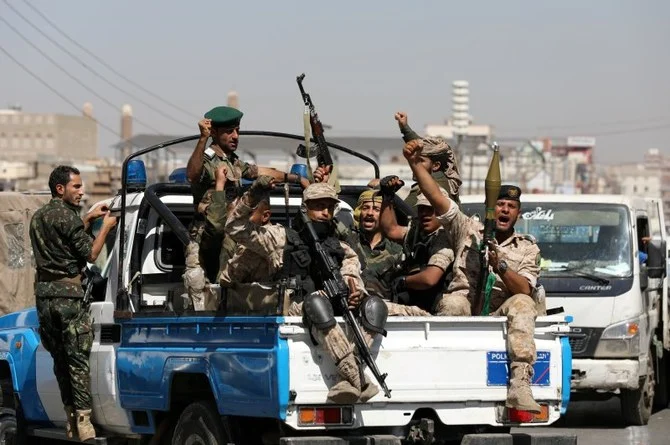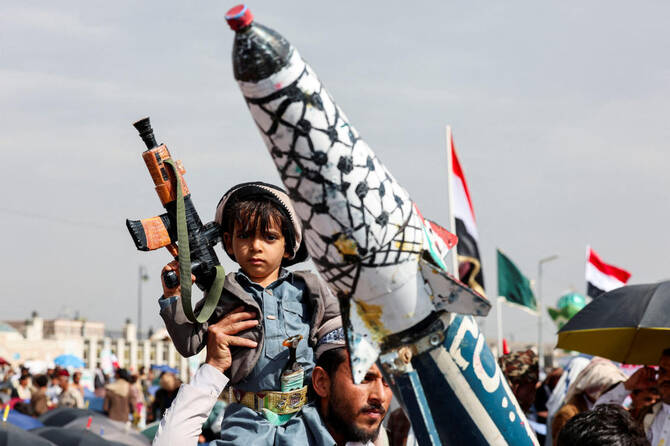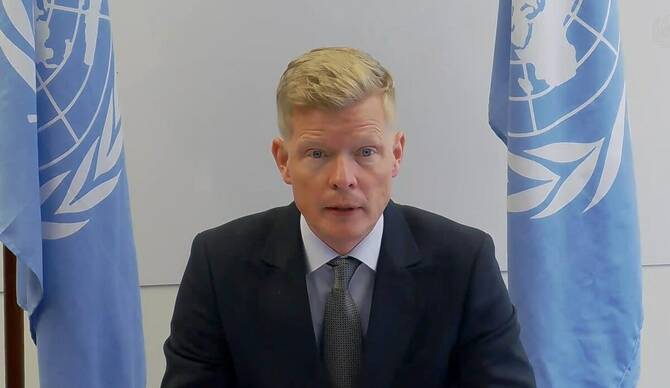AL-MUKALLA: Unidentified gunmen assassinated a tribal chief in Houthi-held Sanaa on Sunday evening, in what appears to be the latest in a series of drive-by shootings and assaults.
Nasser Abdullah Tamah Al-Kumaim, a tribal leader and businessman from the province of Thamar, was reportedly gunned down outside his home by attackers who fled the scene, according to local media reports and comments from relatives.
The Houthis have not commented on the killing but they often link such incidents to family feuds or accuse opponents of carrying out the attacks in an attempt to destabilize the security of their region.
Al-Kumaim, a member of the General People’s Congress party, is the latest victim in a series of deadly drive-by attacks targeting politicians, judges, activists, academics, and military and security officials in Sanaa.
Maj. Gen. Dirham Noman, a retired military commander and former Yemeni ambassador to Ethiopia, was murdered there in October. Brig. Gen. Abdullah Mohammed Al-Kibsi, a Houthi supporter and former member of parliament, was killed outside his home in Al-Hasaba neighborhood in September. Mohammed Hamran, a Supreme Court judge, was killed shortly after he was abducted outside his home in August by a group of armed men.
In 2020, armed men shot dead Hassan Zaid, the Houthi minister of youth and sports affairs, while he was driving in Sanaa.
The Houthis have long boasted that they brought peace and calm to Sanaa and other Yemeni territories under their control, bringing to an end bombings and killings. However, assassinations have been taking place as the Houthis intensify their crackdown on vocal critics, primarily online commentators, and prosecute large numbers of abducted Yemenis amid a growing backlash against the militia’s ruthless rule, their failure to pay public employees, and their inability to alleviate the effects of a famine that is growing worse.
On the battlefield, meanwhile, heavy fighting over the past 72 hours between government forces and Houthis outside the central city of Marib has left a number of combatants dead or wounded.
Maj. Gen. Abdu Abdullah Majili, a spokesman for the Yemeni army, told Arab News on Monday that the Houthis had launched assaults on government troops south, north and west of the city over the past three days, resulting in fierce fighting and significant exchanges of heavy weapons fire.
“These are the most violent strikes since the (UN-brokered) truce collapsed,” Majili said. He added that the fiercest fighting took place in Juba district, south of the city, as the Houthis advanced further into government-controlled territories in an effort to move closer to Marib, the last major urban bastion of the Yemeni government in the north of the country.
Thousands of fighters and civilians have died since the Houthis launched a massive military effort to capture the energy-rich city in early 2021. Despite advancing close to the city, however, they have been unable to conquer it because of heavy resistance from military forces and allied tribesmen, with the help of the Arab coalition.
There was a significant reduction in fighting around Marib, and other once-raging battlefields, after a UN-brokered truce came into effect in April last year. However, it collapsed in October as the Houthis refused to extend it, despite pleas from foreign mediators and relief organizations.
Elsewhere, residents of the southern city of Taiz said Houthi snipers wounded two children in a rural area on Sunday. Abdullah Mohammed Al-Faki, 11, and Menour Mohammed, 8, were playing outside their house in the Saber area when they were reportedly shot and wounded.
Even during the truce, the Houthis did not agree to end their eight-year siege of Taiz, nor did they cease shelling and assaults.






















